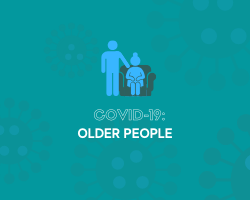Health care considerations for older people during COVID-19 pandemic

The COVID-19 pandemic is impacting the global population in drastic ways and, in many countries, older people are facing the most serious threats and challenges. Although all age groups are at risk for contracting the COVID-19 virus, older people face a significant risk of developing severe illness due to physiological changes that come with ageing and existing underlying health conditions.
It is critical that older people can access health-care services during the pandemic for both emergency and primary health care. Health-care workers, social service providers, family members and community members who provide care for older people must also be supported with the resources they need.
These resources should include innovative approaches to reach older people through telemedicine and technology. Digital literacy of older people needs to be enhanced so they can use mobile apps for receiving information and for communicating with family members and community service providers even when physically separated.
To ensure older citizens have access to the care and support they need during the COVID-19 outbreak, their families and caregivers have to be supported as a priority. Programmes and services that help to meet older people’s needs, promote their health and keep them out of hospital need to be prioritized. Home care, nutritious food, toiletries, medicine, and social support and information for mental and emotional well-being have to be ensured. Older people also need tailored and accurate information on how to stay healthy during the pandemic and what to do if falling ill.
WHO is developing new guidelines and advice for policy-makers, health-care professionals and care facilities on considerations for older people in the context of the COVID-19 outbreak.



